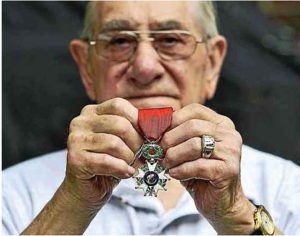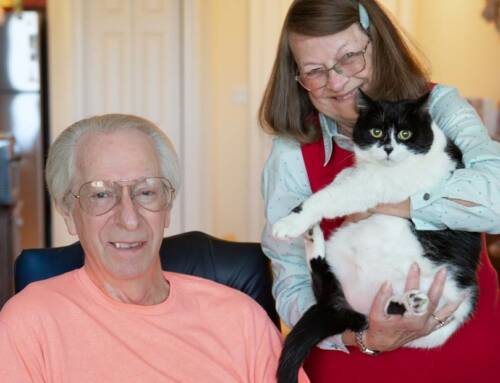Russell Decker considers himself blessed. If he were to tell this to his 19-year-old self, he would’ve been looking into the wide eyes of a perplexed young man.
At age 19, in January 1943, Russell was preparing to serve on the front lines of the U.S. Army fighting in the Invasion of Normandy and the Battle of the Bulge, which eventually led to the liberation of France and the end of World War II.

Russell Decker poses with his Legion of Honour medal. Photo courtesy of the Delaware County Daily Times.
His unit, the 465th Anti-aircraft Artillery Automatic Weapons Battalion – Battery B, was part of General George Patton’s Third Army. In July 1944, when they landed at Utah Beach, their missions included protecting the supply route and communication lines of U.S. troops as they entered the Normandy Peninsula, often facing fire from German soldiers. Russell was part of a five-man crew, which manned four .50 caliber machine guns mounted on a half track.
“We were a band of brothers who covered each others’ backs,”
he said.
Among the young man’s experiences were running into enemy fire to save an injured comrade, an incident which earned him a Bronze Medal. Another vivid memory was seeing a fatally wounded soldier lying on a tank. Russell recognized him as a lifelong friend from his hometown. There was also the moment when a fellow solider, who had just cautioned Russell he’d be sent to Japan next, was hit by a German artillery shell, landed in Russell’s arms and died.
One of Russell’s more jubilant memories was in December 1944, when he discovered an orange for the first time in almost a year in his supply package. Before he had a chance to enjoy the delicious fruit, a French officer passed by pushing a badly injured young girl in a wheelchair. He knew what he had to do and gave her his orange.
The same officer returned with cases of 40-year-old Champagne and invited Russell and his unit to dinner.
“I was a boy who didn’t have anything on his mind,” he said. “I did what I was told. We trained very hard prior to going. More so than anybody. I was up for an experience, which I definitely got. I’ve had many, many experiences being in four major battles. Everything in my life hasn’t been planned.”
Russell’s unit was relieved by British forces, and he returned home to Altoona in October 1945, at the age of 21.
“I’ll just tell you – I would give a million dollars not to do it again, or a million to do it again,” he said. “I’m glad it’s over, but glad I did it.”
The contributions of the Third Army, including Russell’s unit, were summarized by General Patton in a General Order, dated May 9, 1945: “During the 281 days of incessant and victorious combat, your penetrations have advanced farther in less time than any other army in history. You have fought your way across 24 major rivers and innumerable lesser streams. You have liberated or conquered more than 80,000 square miles of territory including 1,500 cities and towns and some 12,050 uninhabited places.”
In 1947, his unit received the Croix de Guerre, or French Cross of War. A commendation signed by U.S. Army Chief of Staff Dwight D. Eisenhower, Capt. W.F. Schell and Major General Edward F. Witsell stated: “(The unit) was called upon to make frequent changes of position and, though barely installed and without protection, it met waves of enemy aircraft, shooting down, in nine days, 93 planes, 32 of which were probable, and damaging a very considerable number.”
Upon his return home, Russell continued his job with the Pennsylvania Railroad. He later worked as a foreman at the Philadelphia Naval Shipyard until his retirement in 1986. He had four children with his wife, Audrey, who passed away in 1996. He later married Louise, and between the two of them, they have five children, 12 grandchildren and 13 great-grandchildren.
In December 2013, Russell came home from his regular visit to the sports club when Louise told him the French Embassy called. He spoke with a representative who invited him to Washington, D.C., on Jan. 28, 2014, for a ceremony. Seventy years after his service, Russell was one of 11 veterans being inducted into the Legion of Honour as a Knight for risking their lives during World War II to fight on French territory. Napoleon Bonaparte founded the honor in 1802 as France’s highest award of gratitude.
“I was very much surprised,” Russell said. “It was quite an honor. I’ve had many honors given to me, more than I ever dreamed I was worthy of.”
The memories of Russell’s service resurfaced when he was unpacking boxes after moving to the Masonic Village at Lafayette Hill in 2015. He discovered a collection of letters he’d sent his mother while serving overseas. When she died, his children saved them, and unbeknownst to Russell, they’d packed them along with his other possessions.
“It’s been 70 some years,” he said. “I have a pretty good memory – a lot of things I’m good at remembering, but some things are vague. Sometimes, I lay awake thinking about that time.”
Russell was never eager to share his experiences, concerned people wouldn’t believe the stories, they may be taken out of context or he may recall the facts incorrectly. A few years ago, he was convinced to speak about the war with a group of school-age children.
“I never talked about it before then,” he said. “They opened me up like a can opener. I had tears rolling down my cheeks from their questions. At first I didn’t enjoy it, but after a while, I was able to give them better answers.”
Russell was invited to Fort Dix in New Jersey on Dec. 10 to give a speech to Army officers and wives. He was also interviewed by the local FOX 29 TV station, and the segment was broadcasted nationally.
“I’ve had many accomplishments,” he said. “Some of them were planned, some accidental. Some of the accidental ones worked out the best. I’ve never been afraid to tackle something. I really enjoy life, and I’ve had a full life.”
Military awards and medals aside, one of Russell’s biggest honors was being the namesake for one of his great-grandsons: Russell Patton Decker. He can only imagine the experiences Russell Patton will have by the time he is 19 years old.




